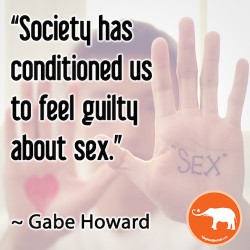*Disclaimer: Elephant Journal articles represent the personal opinion, view or experience of the authors, and can not reflect Elephant Journal as a whole. Disagree with an Op-Ed or opinion? We’re happy to share your experience here.
~
Dear Elephants,
Welcome to this week’s Mental Illness Q&A! My name is Gabe Howard and I am a man living with severe bipolar and anxiety disorders. To submit questions of your own, please email me at [email protected]. Questions that are selected will always remain anonymous. I enjoy reading your thoughts in the comments section. Be respectful, but don’t be shy!
Dear Gabe,
I recently started taking medication for major depression. And now I have difficulty just keeping an erection. I am a young guy and I love sex and I still want to have sex, but can’t really perform. Depression with sex is better than no depression without it, so I’m thinking of stopping my meds.
Frustrated
Dear Frustrated,
This is a common issue for most people taking anti-depressants. For first time users, such as you, it probably comes as quite a shock. If sexual dysfunction is not the number-one side effect, it is without a doubt the number one reason people want to stop taking their medications. For most of us, anything that gets in the way of our sexual needs is quickly eliminated.
You didn’t state your age in your e-mail, but you did include that you were a young guy. Whether you meant to or not, you were making sure I knew that the only solution that was acceptable was for you to regain your sexual ability, and that is perfectly acceptable. Your goal is to both treat your depression and have a normal sex life; therefore you must clearly communicate this to your doctor.
Perhaps you don’t want to tell your doctor about this for some reason. Sex is, in many ways, a private matter. You have to move past any potential embarrassment and be honest. You cannot get good care without honestly reporting what is going on with your body. Society has conditioned us to feel guilty about sex, but it is important to be forthright with your physician to ensure you get the care you need. Your doctor is there to provide medical care, not judgment.
The two main ways to resolve this issue are to switch medications to one that doesn’t have the undesirable side effect or to be prescribed a medication to treat the side effect.
Mental illness medications are not easy to adjust to in the first place. Don’t complicate the issue by incorrectly reporting your symptoms or not addressing your concerns. Finally, don’t live with depression and risk dying by suicide because you don’t want to have an uncomfortable or tough conversation with your doctor.

Lived Experience vs. Medical Advice
There are a few themes that come up time and time again in mental health advocacy and the sexual side effects of medication is certainly in the top five. It is important to consider that the way a person with mental illness looks at treatment and the way a person without mental illness looks at treatment are very different.
To the outside observer, a person who is depressed, delusional or even suicidal has more important things to worry about than his or her sex life. But to the person with the illness, the most important thing is living a happy and fulfilling, even, dare I say, a normal life.
The typical age of a mental illness diagnosis is in the early 20s and it is during this period that the average person begins to fully explore sexuality, sexual desire and sexual fulfilment. For most people, this exploration is an important learning, growing and maturing process.
So when a medicine comes along and halts this process, it is a shock to the system. Typically, the sexual side effect kicks in before the medication has provided relief from the symptoms it was meant to treat. It is seen as a major setback and can be devastating to a person’s progress.
Factor in a person’s—especially a young person’s—difficulty in openly and honestly discussing sex, as well as society’s general way of shaming it, and you end up with a whole lot of people going off much needed medication, rather than working with their doctors to resolve this issue.
Lived experience with mental illness has taught me, and many people like me, that part of battling this illness is not running away from difficult conversations, but meeting them head-on.
It has also taught us that the medical community, as well as society, can help by providing a safe, judgment-free space for people to feel comfortable reporting everything they are going through.
Open, honest, and judgment-free communication isn’t just the best way to fight mental illness—it is the only way.
Love elephant and want to go steady?
Sign up for our (curated) daily and weekly newsletters!
Apprentice Editor:Jamie Khoo/Editor: Renée Picard
Photo: Jasmin Porčič/Pixoto; author’s own










Read 0 comments and reply